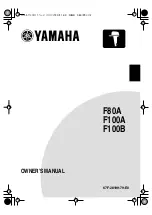
RDG603A74 - Issue 4
Page 35 of 97
SECTION 4
– Operation
NOTICE:
REFER TO THE BARRUS MANUAL PRIOR TO OPERATING THE ENGINE.
NOTICE:
THE OUTBOARD MOTOR WILL REQUIRE COOLANT BEING ADDED PRIOR TO BEING
USED FOR THE FIRST TIME. PLEASE REFER TO:
SECTION 3
– Installation
1. General
•
Familiarize yourself with the electric outboard controls. For example, you must be able
to stop the electric outboard quickly if required, or in an emergency.
•
The electric outboard should only be operated by adults who have been instructed on
how to operate the outboard and have read this manual.
•
Follow the boat manufacturer’s instructions on the acceptable outboard maximum
weight and power output for the
boat. Don’t exceed the capacity limits.
•
Stop the electric outboard immediately if someone falls overboard.
•
Do not submerge the electric outboard motor, controller or other electrical items in
water.
•
Only run the electric outboard when the propeller is under water. If the outboard is run
in the air, the shaft sealant rings (for sealing the motor to the drive shaft) can be
damaged.
•
When the electric outboard is mounted, the tiller electronics are splash proof only. The
tiller and shaft head are not designed to be submerged as this can damage the
electronics beyond repair.
•
After use, turn off the connection between the motor and the battery using the main
battery isolation switch. This completely cuts the power supply to the electric outboard
which will help prevent the batteries from discharging when the outboard is not in use.
•
For manoeuvring in close to shore or pontoon the three-mode switch should be in the
E (economical) position to ensure slow and steady control of the outboard.
•
Do not operate in shallow water or component damage will occur.
Summary of Contents for EZ-S06R
Page 51: ...RDG603A74 Issue 4 Page 51 of 97 Figure 48 Outboard Wiring Diagram S20 ...
Page 54: ...RDG603A74 Issue 4 Page 54 of 97 4 Outboard Dimensions Figure 49 S06 Drawing ...
Page 55: ...RDG603A74 Issue 4 Page 55 of 97 Figure 50 S10 Drawing ...
Page 56: ...RDG603A74 Issue 4 Page 56 of 97 Figure 51 S20 Drawing ...
Page 73: ...RDG603A74 Issue 4 Page 73 of 97 3 LiFEP04 Battery TUV Safety Data Sheet ...
Page 74: ...RDG603A74 Issue 4 Page 74 of 97 ...
Page 75: ...RDG603A74 Issue 4 Page 75 of 97 ...
Page 76: ...RDG603A74 Issue 4 Page 76 of 97 ...
Page 77: ...RDG603A74 Issue 4 Page 77 of 97 ...
Page 78: ...RDG603A74 Issue 4 Page 78 of 97 ...
Page 79: ...RDG603A74 Issue 4 Page 79 of 97 ...
Page 80: ...RDG603A74 Issue 4 Page 80 of 97 ...
Page 81: ...RDG603A74 Issue 4 Page 81 of 97 ...
Page 82: ...RDG603A74 Issue 4 Page 82 of 97 ...
Page 83: ...RDG603A74 Issue 4 Page 83 of 97 ...
Page 84: ...RDG603A74 Issue 4 Page 84 of 97 ...
Page 85: ...RDG603A74 Issue 4 Page 85 of 97 ...
Page 86: ...RDG603A74 Issue 4 Page 86 of 97 ...
Page 87: ...RDG603A74 Issue 4 Page 87 of 97 ...
Page 88: ...RDG603A74 Issue 4 Page 88 of 97 ...
Page 89: ...RDG603A74 Issue 4 Page 89 of 97 ...
Page 90: ...RDG603A74 Issue 4 Page 90 of 97 ...
Page 91: ...RDG603A74 Issue 4 Page 91 of 97 ...
Page 92: ...RDG603A74 Issue 4 Page 92 of 97 ...
Page 93: ...RDG603A74 Issue 4 Page 93 of 97 ...
Page 94: ...RDG603A74 Issue 4 Page 94 of 97 ...
Page 95: ...RDG603A74 Issue 4 Page 95 of 97 ...
















































